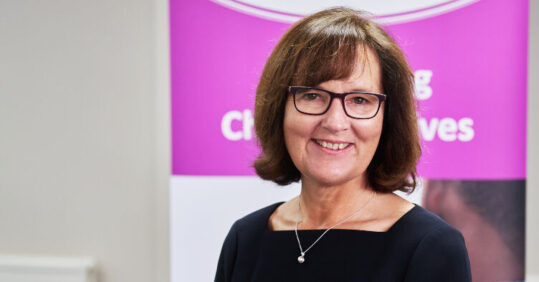Invest in early years prevention or face ‘soaring treatment costs’

Without investment in health visiting and early years care, the government will face ‘soaring treatment costs’ for major conditions, the chief executive of the Institute of Health Visiting (iHV) has warned.
Alison Morton, chief executive of the iHV (pictured), told Nursing in Practice the future of the NHS must involve a ‘change of direction’ towards prevention and early intervention in order to meet the demands facing the health system.
Ms Morton’s comments come in response to the publication of a new report, published by an independent advisory group to the NHS called the NHS Assembly, which called for the NHS to shift towards community care and preventative treatment.
The report’s authors argued that giving children the best possible start in life was ‘a high priority’ for the NHS of the future, made possible by ‘recognising the importance of the early years and the role of affordable childcare, nurseries and schools’.
Related Article: New preceptorship package for social care nurses
Responding to the report, Ms Morton said that it was ‘good to see recognition’ for early years within the document, but noted that existing child health policy was ‘nothing to be proud of’.
Ms Morton described the current state of early years health policy as ‘fragmented and under-funded’, adding that ‘more children are living in poor health’ amid widening health inequalities.
‘Health is not created in hospitals,’ Ms Morton said. ‘Overall, as a nation, we are becoming less healthy. Lives are being cut short and more people are living with multiple, co-existing conditions and health inequities that are largely preventable and take root in early childhood.
‘Without a change of direction towards greater prevention and earlier intervention, the government will need to budget for soaring treatment costs of major conditions in adulthood.’
From the perspective of the iHV, Ms Morton said she would like to see ‘far greater recognition’ for the role of the health visitor in preventing problems before they reach ‘crisis point’, and she added that ‘a cross departmental strategy for health visiting’ was essential.
‘To change the story, we need to change the beginning of the story with a concerted focus on “creating health” in the earliest years – prevention is better than cure,’ she said.
Related Article: Applications to study nursing in England at ‘new low’
‘Spending on the health of our nation’s children needs to be seen as the smartest long-term investment in our nation’s future, rather than a cost – and cannot be judged solely on cashable savings in one or two years.’
However, Ms Morton joined the authors of the NHS Assembly report in their optimism that the recent creation of the Integrated Care System (ICS) provided an ‘ideal opportunity to deliver better joined-up care’.
She also told Nursing in Practice that the upcoming 75th birthday of the NHS provided an ‘ideal opportunity to refresh the vision for health services in this country to achieve health outcomes on a par with the best in the world’.
The NHS Assembly report, published last week, also suggested that ‘strengthening’ general practice and delivering care closer to home should be among the key focuses of the health service.
Responding to Ms Morton’s comments, a government spokesperson said that the Department of Health and Social care was ‘improving support for babies, children, young people, and their families by providing around £300m to fund three-year Family Hubs and Start for Life programmes in 75 local authorities in England, which includes areas with high levels of deprivation’.
Related Article: Paul Rees appointed as permanent NMC chief executive and registrar
‘These are already making a difference by bringing together services and support for families with babies and children of all ages, including Start for Life services for the critical 1001-day period from conception to age-two,’ they added.
‘In addition, the Healthy Child Programme is helping children across all 150 local authorities get the best possible start in life by providing family support from health visitors and school nurses from pregnancy up to school entry. This work will have wide reach across the country and improve outcomes for thousands of babies, children, and families.’

See how our symptom tool can help you make better sense of patient presentations
Click here to search a symptom




